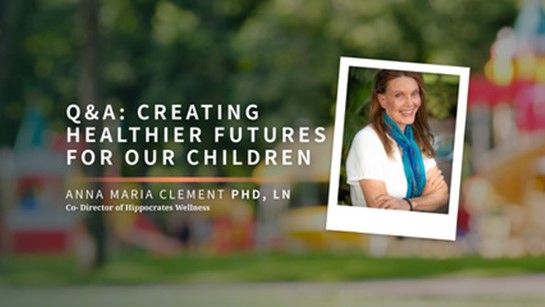Q&A: CREATING HEALTHIER FUTURES FOR OUR CHILDREN
29 Sep 2022
Q&A: CREATING HEALTHIER FUTURES FOR OUR CHILDREN
This Child Health day, we speak to Hippocrates co-director Anna Maria Clement about how lifestyle choices affect our vital health and wellbeing and the all-important future generations.
Q: What are the biggest problems with a typical child's diet in the US?
A: Twenty-five years ago- for the first time in history - 12% of the youth generation in the US and developed countries endured chronic illness. Currently, over 50% of children are afflicted emotionally and physically with diseases presenting an overwhelming and untenable burden on the health care and economic system. Chemically latent non-foods containing disease-causing toxins are casually marketed and accepted worldwide. The consumption of these nutritionally deficient concoctions has resulted in 75% of the youth being overweight, obese, and morbidly obese - presenting health issues such as type II diabetes, autism, asthma, allergies, neurological problems, brain dysfunction, learning disorders, cardiovascular disease, and the number one killer of infants; cancer. It's time for governments and their food and big pharma industry allies to be held accountable.
Q: How do we create good eating habits for children?
A: Parents who live in a "Food Addictive" way pass their unhealthy habits and lifestyles onto their children. The only way to ensure that children eat a diet full of clean and health-building food is for the parents to be a positive influence and example.
Q: Is it realistic to cut out sugar entirely?
A: Sugar is more addictive than heroin and cocaine, as explored in our book: 'Sweet Disease.' Sugar must be replaced with stevia and affirmatively removed from your children's choices. Animal-based foods such as eggs, all dairy including yogurt, fish, chicken, turkey, and all poultry, including pork and red meats, should also be eliminated from the diet. These non-human "food" choices were never meant to be consumed by humans and are totally unnecessary in cultures that consume them. Starting children on this sickness cuisine will set them up for lifelong disorders.
Q: How can we support better food education?
A: When our schools partner with fast food companies - often with multi-million dollar contracts - it is profit first, not children. Although we call ourselves civilized, to prey on the pain and suffering of the youngest among us is proof that we may be significantly more uncivilized than our ancestors.It is not difficult to know how to remedy children's disease and prevent it in the first place. A partnership must be forged globally between conscious parents to empower them to force the institutions we place our children in, to nurture them as precious beings and the future leaders they will become.